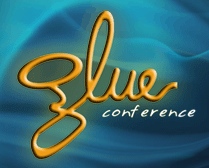 You may know I've attended the Glue Conference in Denver since its inception. I've reported on both of those great events, in May 2009 and May 2010. The last one I live-blogged, and that is luckily archived here. The '09 event, however, I only covered by live tweeting — i.e., all my coverage was done on Twitter — so good luck finding that archive. And it was probably a couple-hundred "posts" long, too. Shees…
You may know I've attended the Glue Conference in Denver since its inception. I've reported on both of those great events, in May 2009 and May 2010. The last one I live-blogged, and that is luckily archived here. The '09 event, however, I only covered by live tweeting — i.e., all my coverage was done on Twitter — so good luck finding that archive. And it was probably a couple-hundred "posts" long, too. Shees…
Anyway, the next Glue is coming up in May 2011, and I certainly plan to be there — live-blogging, not live-tweeting! So, why would I be talking about that event now, when it's several months out? Well, because I have some important *advance* news about it for all my developer friends, whether you're involved in a cloud-based startup or not. Here's the deal:
Eric Norlin runs the event (and sister event Defrag, this month), and makes clear Glue is aimed at developers. That makes it different from other "cloud computing” conferences, which he thinks is a big echo chamber. "Glue seeks to explore the connective tissue of the web and IT infrastructure," says Norlin. 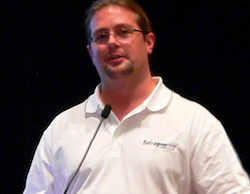 "That connective tissue can be called a lot of things — service oriented architecture, web services, APIs, cloud computing, etc. Call it what you will, developers know that it’s not the name that counts, it’s the building of the application, and the underlying infrastructure that supports it."
"That connective tissue can be called a lot of things — service oriented architecture, web services, APIs, cloud computing, etc. Call it what you will, developers know that it’s not the name that counts, it’s the building of the application, and the underlying infrastructure that supports it."
Norlin says his goal with Gluecon has been really simple: to make it *the* gathering place for developers in the API/cloud space. "With that goal in mind, we’re setting out this year to change the game for developer conferences," he says. "And the only way that I know to change the game is to open things up in such a way as to get maximum involvement from the community. As such, I’m extremely happy to announce that Alcatel-Lucent is signing on to be the Community Underwriter and Partner Sponsor of Gluecon 2011."
So, what does that mean for the event? It's this: Alcatel-Lucent (which runs OpenAPIservice.com) will be underwriting 15 companies to have demo pods at Glue 2011. The participation of these companies will be based solely on merit, not the ability to pay for an exhibit, says Norlin.
"We’re announcing that 15 companies will be selected to have completely free demo space at Gluecon. The demo pod will include passes to the show, signage, Internet — everything you need. Just show up with a laptop."
To select the companies, Norlin says he and Alcatel-Lucent have put together a top-notch selection committee: Chris Shipley (Guidewire Group), Mathew Ingram (of MESH and GigaOM), John Musser (Programmable Web), Laura Merling (Alcatel-Lucent), Alex Williams (ReadWriteWeb), Jeff Lawson (Twilio), Jeff Hammond (Forrester), Ian Glazer (Gartner), Ben Kepes (Diversity.net), Krish Subramanian (CloudAve), Vinod Kurpad (Best Buy), Seth Levine (Foundry Group), and Eric Norlin.
"The process will be simple," says Norlin. "We'll accept applications for the 15 spots, and every person on the selection committee gets to vote for their favorite 15 companies. The top 15 vote-getters will have a demo pod." He points out that Alcatel-Lucent will have just one vote (two if you count Programmable Web, which is owned by Alcatel-Lucent), but not nearly enough to swing a decision. The company wants to maintain the credibility and neutrality of Glue, Norlin says. He points out the selection committee purposely includes analysts (Guidewire, Gartner, and Forrester), journalists (GigaOM and ReadWriteWeb), a manager inside a large corporation (Best Buy), and even other company CEOs (Jeff Lawson of Twilio) to help run through this process. Alcatel-Lucent’s involvement, he says, is altruistic: enlarge the size and interaction around this developer community — "and everyone benefits." Other exhibitors will be still be able to secure exhibitor space, Norlin adds.
But wait — there's more. "We’ll be doing some awesome things leading up to Glue — like holding 'hackathons' around the country, and then flying the winners to Gluecon to participate in a major league hackathon at the conference. And that’ll just be the beginning – stay tuned," he says.
PREDICTION: Minnesota friends, I'm going out on a limb and predicting that one of these hackathons will be held right here in the Twin Cities.
"I’m excited because I feel like we have the ability to really change the game with this one." says Norlin. "If you take away the company-specific conferences — Google I/O, Twitter, F8 — there really just aren’t that many national-level gathering spots for developers in the cloud/API space. There are a lot of 'business level' and 'workshop' conferences that happen around cloud computing, but we’re talking about developers. And even where there are developer gatherings in the cloud/API space, the ability to pay has always been a limiting factor for startups and companies wanting to show their wares and exhibit. That ends with Gluecon 2011! Now, developers in the cloud/API space will have the ability to participate in a pure meritocracy. Wow the selection committee, and you’re in."
Norlin sums up: "At the end of the day, what I want to see is 500-plus developers coming to Gluecon to build apps, figure out cloud infrastructure, scaling, security, and solve the tough problems around API construction, usage, and maintenance."
How does one apply? The process starts here.
Gluecon 2011 will cover a broad spectrum of cloud/API topics that matter to developers — "from Hadoop to Clojure to Active API event processing to Cloud Scaling to Big Data databases (of both the NoSQL and SQL variety) to web protocols (activity streams, PUSH, etc)," says Norlin. "We’re going deeper, getting more technical than ever, bringing in a third day of workshops, just generally stepping up and kicking ass."
So, my developer friends, you think you can hang with the big boys and girls at Gluecon? Well, now you can apply for a Gluecon demo pod, and prove it. (Want more info? Email Eric at enorlinATmac.com.)
See you at Gluecon in May!
UPDATE: Just after I posted, this popped up on ReadWriteWeb: Weekly Poll: What Cities Should Be Chosen for GlueCon Hackathon Tour? So, get busy all you Minnesota tech supporters out there, vote for the Twin Cities!!
 You say you want unrivaled access to movies, music, television, and educational programming at a price you can afford? Well, Twin Cities-based CRAM™ Worldwide is taking you up on that. I recently interviewed CEO and cofounder Daren Klum (see MP3 link below) to try to learn more about what he’s up to. His new startup is out to prove it’s possible to unlock the largest content catalogs in the world so you get true, unlimited content anyplace, anytime — free of tethered connections. Hey, does that get your juices flowing?
You say you want unrivaled access to movies, music, television, and educational programming at a price you can afford? Well, Twin Cities-based CRAM™ Worldwide is taking you up on that. I recently interviewed CEO and cofounder Daren Klum (see MP3 link below) to try to learn more about what he’s up to. His new startup is out to prove it’s possible to unlock the largest content catalogs in the world so you get true, unlimited content anyplace, anytime — free of tethered connections. Hey, does that get your juices flowing?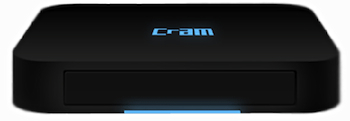 consumers with a unique, simple, and interactive approach to accessing digital content. The company has been quietly developing its patent-pending technology and simultaneously planning the launch of a content network that will position it against some of the largest content distributors in the world, such as Comcast, Redbox, and even Netflix. The key is this: the CRAM™ device will provide content in real, actual HD. My colleague Steve Borsch did an interview of Daren a couple of months ago on Minnov8.com that delves further into the company’s technology.
consumers with a unique, simple, and interactive approach to accessing digital content. The company has been quietly developing its patent-pending technology and simultaneously planning the launch of a content network that will position it against some of the largest content distributors in the world, such as Comcast, Redbox, and even Netflix. The key is this: the CRAM™ device will provide content in real, actual HD. My colleague Steve Borsch did an interview of Daren a couple of months ago on Minnov8.com that delves further into the company’s technology. 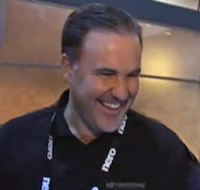 CRAM™ says its content delivery system not only gives customers a far better user experience, but it’s “a fun way to interact with content.” And Daren tells me it will be available for a very affordable monthly subscription. I sat down with him yesterday to talk about his background, how he came to cofound CRAM™, and what the current status is of his startup, as well as his plans for next few months. (For more on Daren and his team, check out the firm’s About page. It is one impressive assemblage of talent.)
CRAM™ says its content delivery system not only gives customers a far better user experience, but it’s “a fun way to interact with content.” And Daren tells me it will be available for a very affordable monthly subscription. I sat down with him yesterday to talk about his background, how he came to cofound CRAM™, and what the current status is of his startup, as well as his plans for next few months. (For more on Daren and his team, check out the firm’s About page. It is one impressive assemblage of talent.)
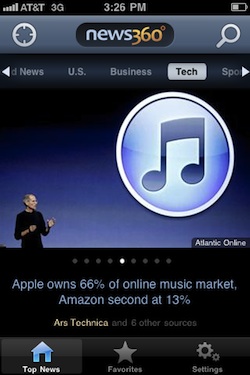

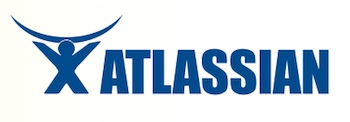
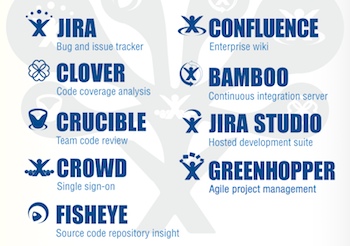


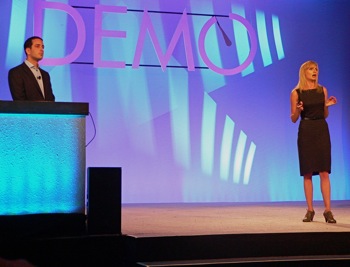
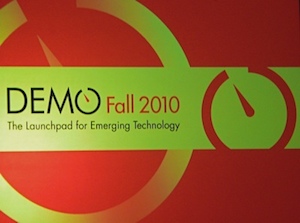

Recent Comments